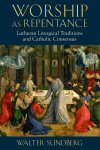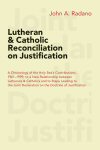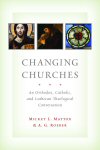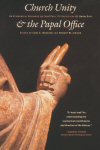Eerdmans Ecumenical Studies Collection (5 vols.)
Digital Logos Edition
Overview
The Eerdmans Ecumenical Studies Collection gathers unique insights from scholars on the modern dialogue about church unity.
Discover important history with Lutheran and Catholic Reconciliation on Justification, which illuminates the evolution of the 1999 Joint Declaration on the Doctrine of Justification. In Changing Churches, you’ll benefit from a unique combination of perspectives, as two men who once communed at the same Lutheran Eucharistic table explain their similar but different decisions to leave the Lutheran faith tradition—one for Orthodoxy, the other for Roman Catholicism. Combined with an afterword by a prominent Lutheran theologian, the authors produce a vibrant dialogue as they address difficult ecumenical questions. Explore theological and ecumenical responses to Pope John Paul II’s encyclical Ut Unum Sint in Church Unity, with contributions from scholars representing Anglican, Orthodox, Lutheran, Methodist, and Evangelical traditions. And in Can a Renewal Movement Be Renewed?, examine a forward-looking assessment of the ecumenical movement by an internationally recognized leader in the church unity movement.
With Logos Bible Software, these volumes are enhanced with cutting-edge research tools. Scripture citations appear on mouseover in your preferred English translation. Important terms link to dictionaries, encyclopedias, and a wealth of other resources in your digital library. Powerful topical searches help you find exactly what you’re looking for. Tablet and mobile apps let you take the discussion with you. With Logos Bible Software, the most efficient and comprehensive research tools are in one place, so you get the most out of your study.
Want an even better deal? Get more books at a bigger discount when you order the Eerdmans Bible Reference Bundle 2!

Key Features
- Presents ecumenical studies from Christian scholars with a variety of backgrounds
- Includes an assessment of the ecumenical movement looking forward
- Offers responses to and histories of important ecumenical documents
Product Details
- Title: Eerdmans Ecumenical Studies Collection
- Publisher: Eerdmans
- Volumes: 5
- Pages: 1,133
- Resource Type: Topical
- Topic: Christianity
Individual Titles
- Worship as Repentance: Lutheran Liturgical Traditions and Catholic Consensus by Walter Sundberg
- Lutheran and Catholic Reconciliation on Justification by John A. Radano
- Changing Churches: An Orthodox, Catholic, and Lutheran Theological Conversation by Mickey L. Mattox and A.G. Roeber
- Church Unity and the Papal Office: An Ecumenical Dialogue on John Paul II’s Encyclical Ut Unum Sint by Carl E. Braaten and Robert W. Jenson
- Can A Renewal Movement Be Renewed? Questions for the Future of Ecumenism by Michael Kinnamon

Against contemporary trends that conceive of Christian worship primarily as entertainment or sheer celebration, Walter Sundberg argues that repentance is the heart of authentic worship. In Worship as Repentance Sundberg outlines the history of repentance and confession within liturgical practice from the early church to mid-twentieth-century Protestantism, advocating movement away from the “Eucharistic piety” common in mainline worship today and toward the “penitential piety” of older traditions of Protestant worship.
American Protestantism is so reflective of the moods of American secular culture that the words ‘sin’ and ‘repentance’ are increasingly banished as dirty language. Sundberg reminds Lutherans that confession and absolution were fundamental for Luther and, although diluted in the Tradition over the centuries, need to be reclaimed in worship. Indeed, without repentance from sin, there is no Good News and no authentic worship.
—Bryan D. Spinks, Bishop F. Percy Goddard Professor of Liturgical Studies and Pastoral Theology, Yale Divinity School and Yale Institute of Sacred Music
Informed by a deep commitment to the gospel and its costly grace, Sundberg provides a compelling and even prophetic account of how modern Christian worship has largely abandoned Christ’s call to repentance and, thus, has greatly impeded the growth of the kingdom of God. Sundberg urges the church to hear this call anew and to allow it to serve as the basis for the church’s liturgical life and mission in the world for the sake of Christ.
—Ronald K. Rittgers, Erich Markel Chair in German Reformation Studies, Valparaiso University
Walter Sundberg is professor of church history at Luther Seminary, St. Paul, Minnesota, an ordained Lutheran pastor, and the author (with Roy A. Harrisville) of The Bible in Modern Culture: Baruch Spinoza to Brevard Childs.

After centuries of estrangement between Lutherans and Catholics, new relationships began at Vatican II and continued to develop during the following decades. In this broader context, Lutheran and Catholic Reconciliation on Justification illuminates the evolution of the 1999 Joint Declaration on the Doctrine of Justification. While describing the steps leading to the Declaration as mutually understood by both partners and showing the important Lutheran initiatives indispensable for those steps, John Radano pays particular attention to the Holy See’s contributions.
Part 1 illustrates initial contacts beginning with Lutheran observers at Vatican II. Before the Council’s conclusion in 1965, a Lutheran-Catholic “Joint Working Group” was formed and dialogue was engaged. In Part 2 Radano describes how mutual understanding and respect developed in the immediate postconciliar period. By 1972, Lutheran-Catholic dialogue reported a “far-reaching consensus” on justification. Part 3, corresponding to the first decade of John Paul II’s pontificate, indicates that continuing dialogues gradually deepened and confirmed the justification consensus. Indeed, John Paul’s own broad contacts with the Lutheran world helped build bonds of friendship and reconciliation. Part IV traces the steps taken by both sides in 1988–1999 to draft and officially sign the Declaration, and it describes the three-day celebration in Augsburg surrounding the signing ceremony.
An afterword tracks the reception of the Declaration since the 1999 signing, including support by Benedict XVI. Most especially, Radano details the World Methodist Council’s official affirmation of the Declaration in 2006, highlighting the document’s truly ecumenical nature.
For those who wish to know how it came about and what it means, Monsignor Radano’s book on the Joint Declaration on the Doctrine of Justification is essential reading. As head of the Western Section of the Pontifical Council for Promoting Christian Unity, Jack Radano had an inside view of the process, and his knowledge is precise and objective. His personal ecumenical experience over decades makes him an excellent judge of the ecclesial and ecumenical importance of the Joint Declaration in its lasting influence on the quest for Christian unity.
—Walter Kasper, president, Pontifical Council for Promoting Christian Unity
John Radano gives a moving formulation of the shared confession of faith and the doctrine that is the heart of the Joint Declaration. . . This welcome addition to ecumenical studies narrates a significant case of the Catholic Church’s present role in the ecumenical movement as a major player. . . . Some Catholics doubt the doctrinal accuracy of what the Joint Declaration affirms on justification. Radano’s book should give them pause, for he shows that the Declaration’s text arose in a process in which those holding the Catholic teaching office participated in sustained ways.
—Jared Wicks, John Carroll University
John A. Radano served on the Pontifical Council for Promoting Christian Unity, Vatican City, from 1984 to 2008 and was head of its Western Section, participating in many international bilateral and multilateral dialogues. Author of Lutheran and Catholic Reconciliation on Justification and of many articles, he is currently adjunct professor in the School of Theology at Seton Hall University in South Orange, New Jersey.

Sharp controversies—about biblical authority, the ordination of women, evangelical “worship styles,” and the struggle for homosexual “inclusion”—have rocked the Lutheran church in recent decades. In Changing Churches two men who once communed at the same Lutheran Eucharistic table explain their similar but different decisions to leave the Lutheran faith tradition—one for Orthodoxy, the other for Roman Catholicism.
Here Mickey L. Mattox and A.G. Roeber address the most difficult questions Protestants face when considering such a conversion, including views on justification, grace, divinization, the church and its authority, women and ministry, papal infallibility, the role of Mary, and homosexuality. They also discuss the long-standing ecumenical division between Rome and the Orthodox patriarchates, acknowledging the difficult issues that still confront those traditions from within and divide them from one another. This volume’s afterword presents the view of Lutheran Paul R. Hinlicky with his thoughts on “Why We All Need Lutheran Theology.”
This book exemplifies the best in charitable yet tradition-specific ecumenical discussion. A.G. Roeber (a Lutheran become Orthodox), Mickey Mattox (a Lutheran become Catholic), and Paul Hinlicky (a Lutheran who remains Lutheran) explain what they find helpful (or indispensable) in Lutheran theology and then why they have transcended (or retained) those Lutheran insights. The result is both a primer in the classical Trinitarianism that the authors share and a set of powerful statements about the Orthodox, Catholic, and Lutheran distinctives that have remained to this point irreconcilable. Evangelical Protestants will especially appreciate the book’s instruction in classical orthodoxies as well as its goad to probe the strengths and weaknesses of their own traditions with the care that these authors have shown toward theirs.
—Mark Noll, Francis A. McAnaney Professor of History, University of Notre Dame
An inspiring, intellectual illustration of the unique concepts and convictions, as well as the theological and cultural differences, in the creative interplay and interchange between Orthodox, Catholic, and Lutheran theologians.
—Elpidophoros Lambriniadis, Metropolitan of Bursa
A bold and considerate book on a highly sensitive subject. In ecumenical theology, the issue of conversion has for the most part been discussed in anonymous and abstract terms. Mattox, Roeber, and Hinlicky offer a personal account that takes this deeply theological issue and the context of our contemporary world seriously.
—Risto Saarinen, professor, faculty of theology, University of Helsinki
With theological precision, frequent brilliance, and occasional brutal honesty regarding all three of the major ecclesial traditions examined in this work, these scholars explore the serious questions at issue if one moves from Lutheranism to Catholicism (Mattox) or to Orthodoxy (Roeber) or if one decides to remain within Lutheranism (Hinlicky). . . . This apologia is poised to make a substantial contribution to ecclesiology at the beginning of the twenty-first century.
—Richard J. Sklba, bishop emeritus, Archdiocese of Milwaukee
Mickey L. Mattox is associate professor of theology at Marquette University in Milwaukee, Wisconsin.
A.G. Roeber is professor of early modern history and religious studies and codirector of the Max Kade German-American Research Institute at Penn State University.

This volume compiles theological and ecumenical responses to Pope John Paul II’s encyclical Ut Unum Sint. A wide range of scholars representing Anglican, Orthodox, Lutheran, Methodist, and Evangelical traditions share perspectives regarding this important work on Christian unity.
Contributors
- Carl E. Braaten
- Edward Idris
- Cardinal Cassidy
- Brian E. Daley
- Joseph-Augustine DiNoia
- Robert W. Jenson
- Richard J. Mouw
- Stephen W. Sykes
- Geoffrey Wainwright
- George Weigel
- David S. Yeago
Never has a Roman pontiff gone so far as Pope John Paul II in inviting other churches to a ‘patient and fraternal dialogue’ concerning his office. Here is one of the very first and most stimulating responses to that invitation, wide in range and with excellent contributions. It merits the careful attention of all those who are troubled by or interested in this crucial ecumenical problem.
—Harding Meyer, Institute for Ecumenical Research, Strasbourg
A thoughtful, engaging symposium on the most important ecumenical document of our time. Both ecumenically serious and theologically honest, this book is a signal contribution to the ongoing quest for Christian unity.
—Timothy George, dean of Beeson Divinity School, Samford University
An interesting read for those fascinated by history, ecumenism and the Christian future.
—Religious Studies Review
As Pope John Paul II and his predecessor Paul VI have said, understanding the Petrine ministry of the Bishop of Rome and how it might be exercised in the future is key to the search for Christian unity. Only honest dialogue about where we stand on this question and a sincere openness to the guidance of the Holy Spirit will allow progress in fidelity to Christ’s will for his people. This book offers an important ecumenical contribution to the present status of the question and careful exploration of possible avenues into a shared future.
—Francis Cardinal George, Archdiocese of Chicago
Braaten and Jenson, well-known ecumenists and theologians in the Lutheran tradition, have edited this impressive collection of essays. . . . The volume is substantive beyond its size and ample beyond its explicit focus. It will be of interest not only to ecumenists but to all concerned with fundamental issues of ecclesiology. . . . All in all this is a provocative and rewarding collection that I highly recommend.
—New Theology Review
The essays in this fine book testify to the richness of the conversation. The editors describe Church Unity and the Papal Office as ‘a kind of thanksgiving offering in appreciation of the pope’s effort to promote the unity of all Christians and full communion between the churches.’ The contributors should be thanked for a frank dialogue, and the editors for ensuring that it continues.
—Worship
Carl E. Braaten is professor emeritus of systematic theology at Lutheran School of Theology at Chicago and former executive director of the Center for Catholic and Evangelical Theology.
Robert W. Jenson is codirector of the Institute for Theological Inquiry and was cofounder and longtime associate director of the Center for Catholic and Evangelical Theology.

There is no doubt that ecumenism occupies a prominent place in the history of the church in the twentieth century: countless churches have been renewed through encounter with Christian sisters and brothers in other confessions and cultures. But it is not clear that this ecumenical impulse will continue to figure prominently in the church’s story.
In this book Michael Kinnamon argues that the ecumenical movement, which has given such energy and direction to the church, needs to be reconceived in a way that provides renewing power for the church in this era—and he shows how this might happen. He names the problems with ecumenism, identifies strengths and accomplishments upon which the church now can build, and suggests practical, concrete steps we can take in the direction of revitalization, especially at the local level.
Michael Kinnamon’s well-resourced, clear, and thoughtful book reviews past achievements and proposes future directions for American conciliar ecumenism. His very practical, always informative, and sometimes disconcerting observations will challenge readers to deepen their own commitment to Christian unity.
—John W. Crossin, OSFS, United States Conference of Catholic Bishops
Calls us as the body of Christ to be a greater witness to God’s shalom and Christ’s peace together than we could ever hope to be as separate communities. . . . A helpful vision for a vital church in the twenty-first century.
—Stanley J. Noffsinger, Church of the Brethren
Kinnamon draws on an immense wealth of experience to ask hard questions on what is hindering the ecumenical movement from moving forward as an effective and vital force. His suggestions are affirmative, bold, and clear—and, perhaps more importantly, doable. This book is a must for any who are honest enough humbly to admit a crisis of diminishing energy in the formal ecumenical movement but are nonetheless committed to the renewal of authentic Christian unity as a central and critical task for gospel witness in today’s world!
—Tony Richie, Society for Pentecostal Studies
Takes us on a remarkable journey investigating the division between unity and justice among religious movements and institutions. . . . A profoundly important guide.
—Rabbi Steve Gutow, Jewish Council for Public Affairs
Insightful, direct, and greatly invested in the ecumenical movement, Kinnamon helps us traverse the changing ecumenical landscape with concrete steps and a positive, realistic global perspective. Can a Renewal Movement Be Renewed? is a must-read for all who care and want to do something about the revitalization that the church so desperately needs.
—Marilyn Mecham, former president, Ecumenical and Interreligious Leaders Network
This book gives us a glimpse into the mind and heart of someone who has earned his place as a valued leader among America’s diverse church traditions. It reveals Michael Kinnamon as both teacher and student, as having profound wisdom, humility, and magnanimity—qualities that can guide whole churches into a deeper engagement with each other and into a more dynamic engagement with the world.
—Vicken Aykazian, archbishop, Armenian Orthodox Church
Michael Kinnamon is the Spehar-Halligan Visiting Professor of Ecumenical Collaboration in Interreligious Dialogue at Seattle University’s School of Theology and Ministry. Among his other books is The Vision of the Ecumenical Movement and How It Has Been Impoverished by Its Friends.
This title is included in the following collections
You can save when you purchase this product as part of a collection.
Bible Reference Bundle 2.0
$4,512.95$3,599.99Logos 8 Collector's Edition Le...
$11,399.99$11,399.99Logos 8 Ultimate Legacy Librar...
$21,749.99$21,749.99Eerdmans Ultimate Collection (...
$37,403.33$27,999.99